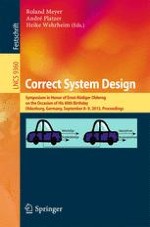2015 | Buch
Correct System Design
Symposium in Honor of Ernst-Rüdiger Olderog on the Occasion of His 60th Birthday, Oldenburg, Germany, September 8-9, 2015, Proceedings
herausgegeben von: Roland Meyer, André Platzer, Heike Wehrheim
Verlag: Springer International Publishing
Buchreihe : Lecture Notes in Computer Science
